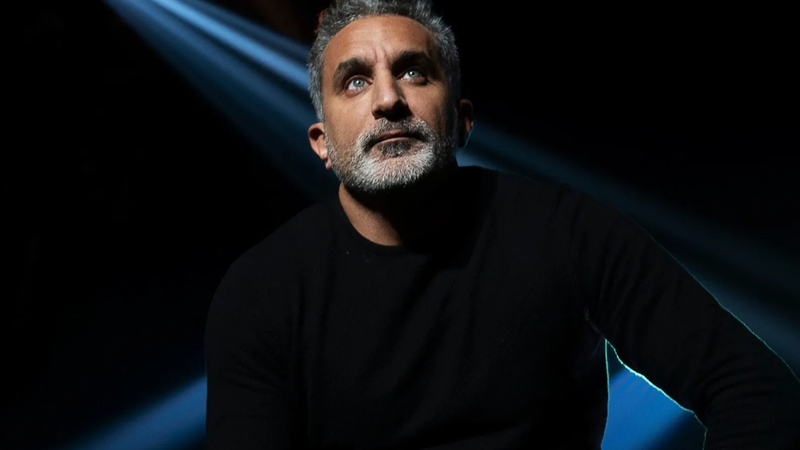All About Egyptian Satirist Bassem Youssef highlights the story of a man who dared to mix humor with truth. From a skilled cardiologist in Cairo to a global voice for satire and freedom, Bassem Youssef’s journey remains one of courage, wit, and resistance.
His story shows how laughter can challenge power and spark social awareness even in the most restrictive environments.
In this article, we will trace his early life, his rise to fame, his television show Al Bernameg, his exile, and his current work — showing how satire became his tool to challenge power. The keyphrase “All About Egyptian Satirist Bassem Youssef” (and its variants) will appear throughout.
Early Life and Education

Bassem Raafat Mohamed Youssef was born in Cairo on March 22, 1974. He grew up in a middle-class Egyptian family that valued education, discipline, and honesty. Passionate about science, Youssef pursued medicine at Cairo University, later specializing in cardiothoracic surgery.
For years, he worked as a respected heart surgeon, saving lives daily and staying far from politics. But when Egypt entered the historic wave of protests in 2011, Youssef found himself drawn toward a different calling — using satire to express what people could not say openly.
The Beginning: The B+ Show
In 2011, Bassem Youssef launched his first online show called The B+ Show. Recorded in his laundry room with a basic camera and desk, the show mocked the state media’s bias and the absurdity of political reporting. It quickly went viral, gathering millions of views within weeks.
The humor was fresh, sharp, and fearless. He didn’t use violence or propaganda — only sarcasm, facial expressions, and logic. People began to see him not just as a comedian, but as a brave new voice who spoke the public’s truth.
The Rise of “Al Bernameg”
After The B+ Show became an internet sensation, Youssef was offered a television deal to create a full satirical program — Al Bernameg (Arabic for “The Program”). The show combined monologues, sketches, interviews, and parodies inspired by international political satire formats.
Each episode attracted millions of viewers across Egypt and the Middle East. For the first time, Egyptians saw someone making fun of politicians, media anchors, and even religious leaders on mainstream TV. The show broke barriers in a country where such criticism had long been taboo.
Youssef’s humor cut across political lines. He mocked hypocrisy wherever he found it, regardless of who was in power. His comedic style combined logic, compassion, and boldness — traits that connected him with both the youth and older generations seeking truth behind the chaos.
Conflict, Censorship, and Cancellation

The success of Al Bernameg soon came with a heavy price. The government viewed Youssef’s satire as a direct challenge to authority. Lawsuits and public attacks followed. He was accused of insulting religion, mocking the president, and spreading false news.
The pressure intensified. His show was suspended, moved to different channels, and ultimately cancelled. In public statements, Youssef said he ended the program to protect his team and family, explaining that Egypt’s political environment no longer allowed genuine satire.
Despite the challenges, Al Bernameg remains the most popular and influential TV satire ever produced in the Arab world. Its cancellation marked the end of an era for free expression in Egyptian media.
Life in Exile and Reinvention
After 2014, Bassem Youssef moved to the United States. His exile marked the beginning of a new chapter — one of transformation. He began performing English stand-up comedy, writing books, hosting podcasts, and participating in international talk shows.
In the US, he adjusted to a different audience, culture, and sense of humor. His performances explored migration, freedom, media hypocrisy, and the immigrant experience. He also published his book Revolution for Dummies, which reflects on the Arab Spring, censorship, and the power of laughter.
He described exile as bittersweet — a mix of relief and longing. Although he gained freedom of speech, he missed home, language, and the laughter of his Egyptian audience.
The Documentary “Tickling Giants”
A major part of his legacy is the documentary Tickling Giants, which follows his journey from his first viral videos to the cancellation of Al Bernameg. The film captures how satire can shake societies and provoke both admiration and fear.
It also shows Youssef’s resilience and the courage of his team, who faced constant intimidation and public pressure. The documentary received international praise for showing how humor became an act of resistance.
His Return to Arab Screens
After more than a decade away, Bassem Youssef is returning to Arab television. He is set to appear in a new interview series called The Last Word (Kalema Akheera), where he will share personal reflections, behind-the-scenes stories, and the untold experiences from his years in exile.
This return marks an important moment not just for him but for Egyptian audiences who grew up watching Al Bernameg. Many see it as a hopeful sign that open discussion may once again find a place in Arab media.
Global Voice and Influence
Youssef’s influence extends far beyond Egypt. Today, he tours globally, performing in both English and Arabic, reaching audiences across Europe, North America, and the Middle East. His comedy blends global issues — such as media bias, identity, racism, and freedom — with personal experiences as an Arab expatriate.
He often reminds audiences that satire is not about disrespecting authority but about questioning it. His jokes challenge fear and hypocrisy, offering laughter as a form of political education.
His work has inspired a new generation of Arab satirists who now use YouTube, podcasts, and social platforms to speak freely. Many credit Youssef for opening the path for digital comedy and political commentary in the region.
Plans for Film and Media Projects
In recent years, Youssef has announced plans to create a film that challenges negative stereotypes of Arabs in Western media. He believes Arabs should tell their own stories instead of being portrayed through biased lenses.
This project aims to highlight Arab culture, resilience, and humor — elements often ignored in global cinema. His goal is to change perceptions while maintaining his signature mix of wit and realism.
Academic and Social Impact
Scholars now study Youssef’s work as part of modern political communication. His career shows how humor can act as a tool of resistance. Academics describe his journey as an example of “soft power” — the ability to influence through creativity rather than force.
He is also frequently invited to universities and conferences to discuss media, freedom, and democracy. His speeches emphasize that satire and critical thinking are essential for a healthy society.
Challenges and Controversies
Bassem Youssef has never shied away from controversy. His strong opinions on religion, politics, and global issues have sometimes sparked anger from both conservatives and liberals.
Some accuse him of being too harsh or biased, while others believe he represents courage and truth. He accepts that satire cannot please everyone. For him, disagreement proves that comedy is working — because it makes people think.
He also faces challenges adapting his humor for different cultures. What provokes laughter in Cairo may not work the same way in New York. Yet, his universal message — to speak truth through humor — remains consistent everywhere.
Recent Recognition
Youssef continues to receive international recognition for his contribution to free expression. In 2024, he received a major award for his influence on public discourse. He uses such platforms to highlight the importance of empathy, tolerance, and critical media awareness.
Even after years abroad, he maintains a strong connection with his Egyptian audience through social media and global appearances. His upcoming TV return shows that his voice still matters — and that satire never truly dies.
Legacy and Future Vision

All About Egyptian Satirist Bassem Youssef wouldn’t be complete without understanding his legacy. He changed Arab entertainment forever by proving that laughter can be a form of truth.
His courage paved the way for digital creators, journalists, and performers who now dare to question authority. He has shown that satire is not merely comedy — it is an act of civil courage.
Looking forward, Youssef plans to focus on global storytelling, film, and new media platforms. His next goal is to help shape how Arabs are represented around the world. He believes storytelling, humor, and empathy can build bridges between East and West.
FAQs About Egyptian Satirist Bassem Youssef
Why did Bassem Youssef leave Egypt?
He left Egypt after facing repeated lawsuits, censorship, and threats linked to his TV show Al Bernameg. The environment became unsafe for free satire, leading him to seek creative freedom abroad.
What made Al Bernameg so popular?
It was the first show to openly mock Egyptian politics on national television. It combined bold humor, sharp analysis, and relatable sketches that connected deeply with viewers from all walks of life.
Did he face legal consequences for his satire?
Yes. He was interrogated and fined several times for allegedly insulting religion and political leaders. These pressures eventually forced the show off air.
Does Bassem Youssef believe satire can change politics?
He believes satire cannot overthrow governments but can open minds and spark dialogue. For him, laughter is the first step toward awareness and freedom.
What can viewers expect from his return to Egyptian TV?
His return will feature honest reflections on his personal and professional journey, untold stories from his years in exile, and thoughtful conversations about media, identity, and the future of free expression.
Final Thought
All About Egyptian Satirist Bassem Youssef tells a story that blends humor with history. From saving lives as a surgeon to saving truth through satire, Youssef redefined how Egyptians see power, politics, and laughter.
READ MORE: Pakistan’s Federal Constitutional Court
His courage continues to inspire millions who believe that humor can stand against oppression. Whether through television, stand-up, or film, Bassem Youssef remains a voice of reason — reminding the world that even in dark times, laughter still has the power to heal and unite.







